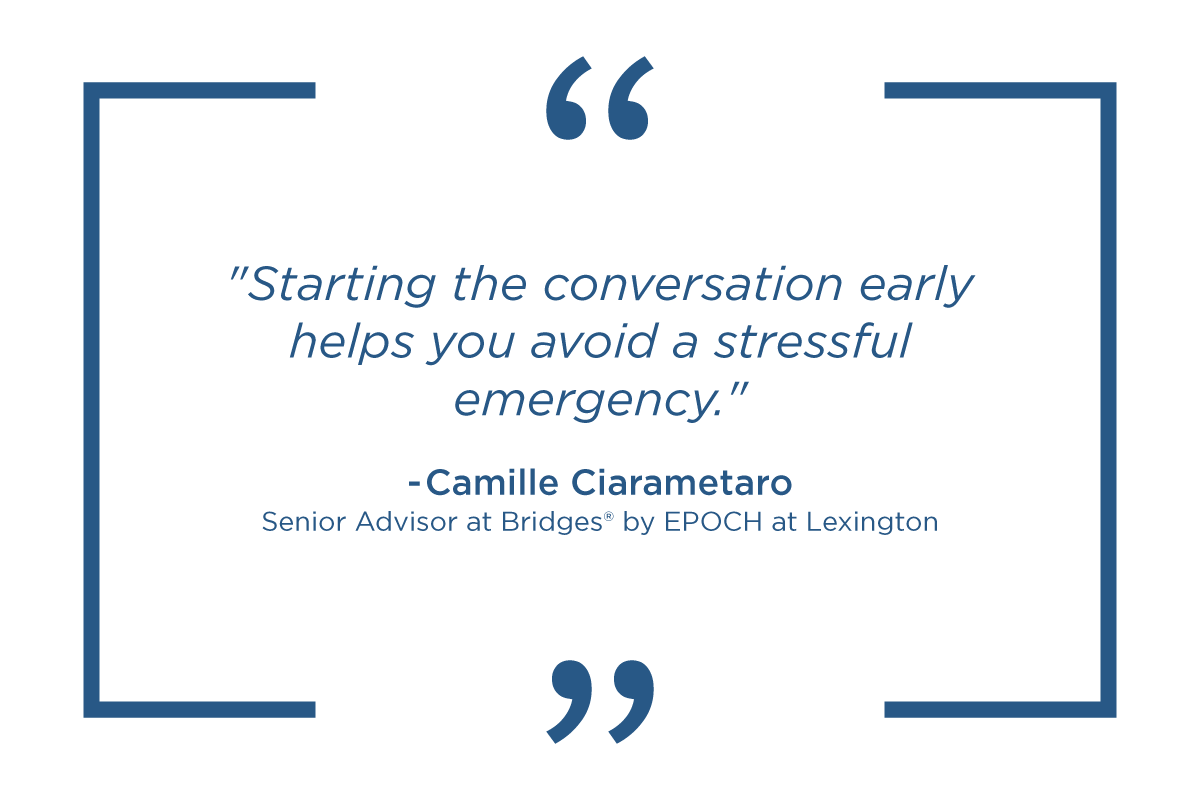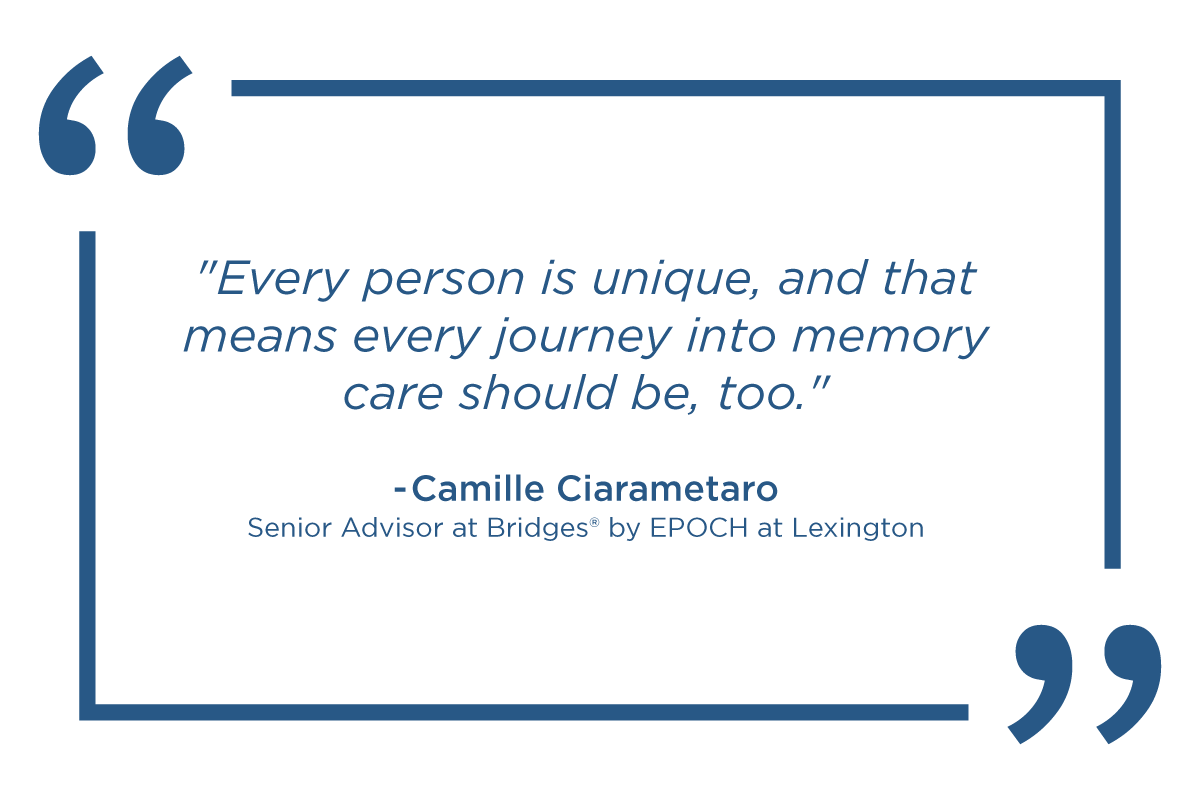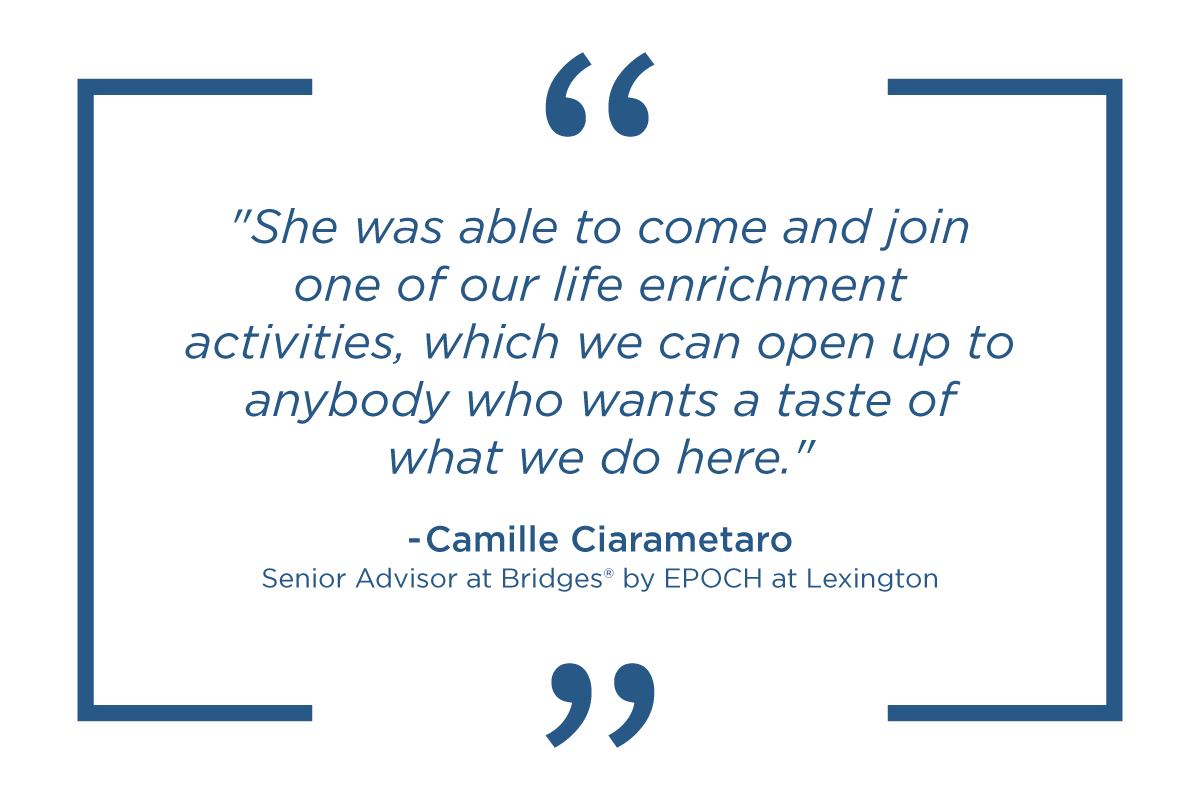By Camille Ciarametaro, Senior Advisor at Bridges® by EPOCH at Lexington
When I first started working with older adults, I knew I’d found my place. I’ve always had a deep respect for seniors, especially those navigating the complexities of memory loss.
I have been very close with the elders in my own family, and a lot of them struggled with dementia issues as they aged. This affinity naturally led me to social work with the elderly, and I’ve been engaged in this field happily for more than 25 years.
Now, as a Senior Advisor at Bridges® by EPOCH at Lexington, I have the privilege of walking alongside families through one of the most emotional decisions they’ll face.
And if there’s one thing I hope more people hear, it’s this: You don’t have to wait for a crisis to start talking about memory loss.

Camille Ciarametaro
Senior Advisor at Bridges Lexington
With years of experience guiding families through these transitions to memory care, Camille offered thoughtful insights into the benefits of early dementia detection.
What to Look For: When Is It Time to Speak Up?

One of the questions I hear most often is, “How do I know it’s not just normal aging?” That’s an important question, and not always an easy one to answer, especially as we should never paint everybody with the same brush: Each case is different.
Forgetfulness alone isn’t necessarily a cause for concern. We all misplace our keys or forget a name now and then. But when daily routines begin to break down — medication schedules, financial tasks, keeping appointments — it may be time to pay closer attention.
Sometimes, it’s the individual who brings up their concerns. I’ve had people sit with me and say, “I can just feel that something’s not quite right.” That matters, and is enough to start a conversation.
You don’t need a diagnosis to seek answers or to start planning. In fact, reaching out early can make a huge difference in the kind of care and support that’s available down the line.
Why Does Early Detection Matter?

Yes, hearing the word dementia is difficult. But there’s something deeply empowering about putting a name to what’s been happening. For many families I’ve worked with, early detection brings a strange kind of peace. It gives shape to what’s been unclear. It allows space to talk things through with clarity, rather than in a panic.
Early diagnosis opens doors. There are more options available when symptoms are caught early, from medical treatments to supportive programs. More than that, though, it offers time. Time to make decisions together. Time to express wishes and values. Time to simply be present before things become more difficult.
I remember one daughter telling me, after she and her mom received a diagnosis:
“We finally understood what was happening. And we could stop guessing. We could just focus on what mattered.”
Early Dementia Detection:
What Happens When You Wait?

Unfortunately, I’ve seen the other side, too, when families wait until something serious happens before seeking help. Maybe someone wandered out of the house. Maybe a fall landed them in the ER. Or maybe a caregiver is burned out after months of trying to manage escalating, challenging symptoms all alone.
These moments are heartbreaking. They often leave families scrambling, having to make impactful decisions under pressure, sometimes without the input of the person they love most.
The emotional weight of that cannot be overstated.
Starting the conversation early helps you avoid a stressful emergency. It offers the opportunity to plan with intention, to build a path forward with support, and to avoid having to rush into unfamiliar territory at a moment when everybody is going through the trauma of the situation.
What a Thoughtful Transition to Memory Care Can Look Like

At Bridges®, we don’t believe in cookie-cutter transitions to memory care. Every person is unique, and that means every journey into memory care should be, too.
Some families I meet with just want to learn. Others come in for a casual visit, attend a program, or share coffee with residents and team members. There are many benefits to coming to visit us at Bridges®. For one thing, a lot of people tend to have a negative image of memory care in their heads. I like to encourage visits because I know our community dispels that myth for families. They see friendly team members, well-cared-for residents, bright, open, welcoming spaces, both inside and out, and their reservations often melt away.
It’s about giving people the space to imagine what’s possible, to visualize themselves in this environment, as a resident or visitor.
Taking this tour early in your journey with dementia, without the pressure of a high-stakes, immediate decision, is a much better experience.
Early Dementia Detection:
A Best-case Scenario Case Study

I think of one woman who visited before moving into Bridges at Lexington.
This woman’s daughter had been noticing things were a little off with her mom. She understood things were changing for her mother at the same time as she was seeing increased responsibilities at work and her children growing up. As a daughter, she was realizing that, down the line, things could get difficult.
There was also some disagreement within the family about what was best for mom. This often happens, which adds an extra layer of stress. The daughter happened to reach out to me, and I encouraged her to speak with a professional. Mom ended up being diagnosed with mild cognitive impairment.
Fast forward, and this progressed to the early stages of dementia. Thankfully, since they had had this discussion earlier, it gave them time to wrap their heads around the issue. Mom clearly expressed her wishes to the rest of the family about what she wanted to do.
Moving to Bridges®
As part of this process, they ended up getting back in touch with us at Bridges. They started to visit every so often. She got to know our team and found comfort in the familiarity.
She was able to come and join one of our life enrichment activities, which we can open up to anybody who wants a taste of what we do here.
As a result, when she eventually committed to transitioning to Bridges, she was prepared. She had been able to decorate her room ahead of time. On her first day, she jumped right into an art class, something she’d been looking forward to.
That’s the kind of story that stays with me as the best-case scenario for a transition.
We benefit from this planning, too; our team was fully prepared ahead of time, having gotten to know the resident and her family.
The family took comfort in knowing their loved one had agency in the decision. They were so grateful that everything happened so smoothly. In addition, they knew we could take care of their mom through all stages of dementia, so that they won’t have to move elsewhere as the disease progresses.
Successful transitions like this are only possible when there’s time to prepare. And that time comes from starting early:
Supporting the Whole Family
Memory care is never just about the person with the diagnosis. It’s about daughters trying to juggle work and caregiving, and husbands and wives learning to love someone in a new way. The neighbors, friends, and extended families who show up with questions, concern, and a lot of heart.
That’s why, at Bridges®, we care for families as well as individuals with dementia.
Support Groups
Every Bridges® community offers in-person caregiver support groups, open to anyone in the local area. These aren’t formal lectures or intimidating clinical discussions. They’re safe, welcoming spaces where you can sit beside others who understand, because they’re walking a similar road. We talk, we listen, and we remind each other that no one has to carry this alone.
We also know that not everyone can attend in person. That’s why we offer virtual support groups, so even if you’re far away or managing other responsibilities, you can still find connection and comfort. It’s a chance to ask questions, share what’s working (or not), and just be with people who get it.
Families tell us again and again how much these spaces mean to them. Sometimes, it’s the first place they’ve been able to speak openly. They like to be heard, supported, and reminded that they’re doing the best they can.
Education
In addition to ongoing support, we host monthly educational sessions led by dementia care specialists. These cover real, relevant topics that caregivers often face, including:
- Understanding wandering and how to reduce risk
- Preventing caregiver burnout
- Communicating through art and music therapy
- Navigating sundowning and late-day anxiety
- Managing difficult behaviors with compassion
Whether you’re new to dementia caregiving or deep in the journey, these sessions are designed to inform and empower.
And beyond all of that, sometimes, we’re simply here to pick up the phone. If you’ve had a tough day or if you just need someone to listen, we’re here with compassion and without judgment.
At Bridges®, we believe deeply in the dyad of care: the idea that supporting the family is just as vital as supporting the person living with memory loss. We are an extension of your circle of care, every step of the way.
Benefits of Early Dementia Detection:
Speak to Somebody

If you’ve noticed changes or even just have a feeling that something’s different, I hope you’ll reach out to a medical professional. I also hope you’ll consider having a conversation with the team at Bridges®.
Getting an early diagnosis benefits everybody involved.
That’s not to scare you by saying it’s urgent or an emergency; I don’t know the intricacies of your circumstances, and there isn’t a one-size-fits-all solution anyway.
Instead, I encourage you to start a conversation because taking that step now might just give you and your family more time, more choices, and more peace of mind. These are the critical benefits of early detection of dementia.
Let’s talk, when you’re ready. Whether Bridges is your next step or not, we’re here to help.

